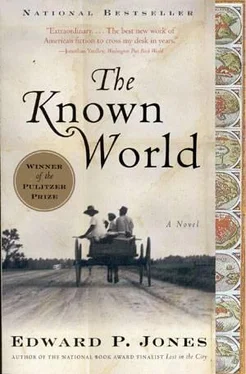At the end of two weeks or so of being with Robbins, Henry would come back to his parents, his eyes gleaming and his heart eager to share whatever part of Virginia he had been to. Mildred and Augustus, hearing their son’s horse approach, would go out into the road and wait for him to appear, as patient as Henry waiting for Robbins to come up the lane to the mansion. Robbins had told him to trust the Manchester National Bank and Henry would put part of what he earned there. The rest he and his father would, as soon as he was off his horse, bury in the backyard, covering it all with stones so the dog would not dig there. Their neighbors were all good and honest people but the world had strangers, too, and some of them had strayed from being good and honest. Then the three would walk the horse into the barn, settle it down and come into the house, holding close to each other.
Henry went through his late teens that way.
The desire to live in Richmond had seized Philomena Cartwright when she was small, long before she became free. She was born on Robert Colfax’s plantation, which was where Robbins first saw her when she was fourteen. When she was eight, Colfax purchased two slaves from a man traveling about the countryside selling off his property, human and otherwise, because he was going bankrupt. He aimed to make a new start in a new life, the man told Colfax, and he started that new life by giving Colfax a good price for the slaves. One of them was Sophie, a thirty-five-year-old woman who liked to tell the young Philomena what a grand place Richmond was, though in fact she had gotten no closer to Richmond than a dot called Goochland. In Richmond, Sophie said, the masters and their wives lived like kings and queens and had so much that their slaves lived like the everyday white masters and wives they saw around Manchester. The Richmond slaves had so much to eat that they were forever having to get new clothes as their bodies changed practically every week. There were Richmond slaves who themselves had slaves, and some of the slaves of slaves had slaves, Sophie said. And there were fireworks every night to celebrate anything under the sun, even a little child losing the first tooth or taking a first step. If it was a happy part of life, Richmond would celebrate it. The stories about Richmond started when Philomena was eight, and they were still coming when Robbins saw her for the first time.
That day Robbins came up to Colfax’s house on Sir Guilderham and saw the girl come down from the back of the house and walk down to the quarters. She had a load of laundry she was carrying on her head. He got off the horse and walked with the horse to the quarters, and he noted the cabin she went into. He often had to go to Richmond but he thought it as bad as Sodom.
He mentioned the girl to Colfax and within two weeks Colfax had sold her to him. Robbins had two children by a slave who lived with those children on a far cabin on his plantation but it had been nearly a year since he had been with her. Six months after his relationship with Philomena began, after he had put her in a house a little ways outside the town with a maid he brought in from his plantation, she told Robbins she wanted her mother and brother with her, and Robbins purchased them as well, though Colfax was not as generous with the price as he had been with Philomena. Robbins freed Philomena for her sixteenth birthday and several months later gave her her mother and brother. She had him purchase Sophie-who told stories about Richmond-two months after that, in her first month of being pregnant with Dora. Philomena’s brother soon managed to run away with Sophie and Philomena proclaimed her ignorance about what they had been up to, and she said it in such a way that Robbins believed her. Robbins did everything he could to have them found and brought back but they had disappeared. He offered a bounty of $50 for each of them, and then a month later he raised it to $100 each, making the dollar amount the largest thing on the wanted posters. Philomena didn’t seem to mind that she had lost two pieces of property. She told her mother that she believed they had ended up in Richmond, and some days she was happy for Sophie, having loved her for many years, but on other days she despised her for now having the life she herself wanted in Richmond. Would they, she wondered one day after Sophie had been gone a year, run out of fireworks before she herself could see Richmond?
The birth of Dora pulled Robbins even closer to Philomena than he could imagine. She called him “William” for the first time when the child was a week old and he did not correct her, came to enjoy the way his name flowed out of her mouth and seemed to swirl about in the air like some meaningless song before his brain registered and told him that was his name. He enjoyed being with her even when she was pouting and acting too much the child. “You don’t be treatin me right, William. You just don’t, William.”
The need to be in Richmond returned strong with the birth of Louis, three years after Dora’s. The need had never gone away but the birth of Dora had helped turn her into a woman who could bide her time; even devoid of fireworks, Sophie’s Richmond was an eternal city and would wait for Philomena. But Louis’s coming made her morose, and day by hard day, she turned over the care of the children to her mother and the maid, who was now her property as well.
She ran away to Richmond for the first time when Dora was six. Robbins sent his overseer to fetch her and that man found her sleeping in the streets, where she lived after she had used up what little money she had brought to Richmond. The overseer let it be known, in his indirect way, that he did not appreciate being used to haul back his employer’s bed partner. The second time Philomena fled to Richmond she took her children and had more money than the first time. Dora was eight and Louis was six. Robbins himself went for them and took Henry, who was sixteen years old at the time. It was Henry’s second time in Richmond.
At the end of a long day Robbins found the three in a boardinghouse less than ten blocks from the Capitol, the same place Philomena had stayed in her first time in Richmond. The man and the woman who owned the place, people who had been born into freedom, opened the door and held their candles high to take in the face of the tall Robbins and told him which room upstairs he could find Philomena.
Robbins stood at the closed door for a long time and Henry stood less than two feet away, wanting, for the first time ever, not to be anywhere near the white man who had come to mean so much to him. At last Robbins turned and looked briefly at Henry in the dim hall. Henry held a lamp the owners of the house had given him but the smoking lamp was poor with light. “What is today, Henry?” “Wednesday, Mr. Robbins.” “I see. And so far from midnight to make it Thursday.” “Yessir. A good ways from midnight.” Robbins opened the door.
Henry watched from the doorway, afraid to go and afraid to stay. Philomena was sitting on the side of the bed, one slipper on and the other across the room, and she did not look surprised to see Robbins. She was alone in the room and the two lamps there, one on the table beside the bed and the other atop the chiffarobe, gave abundant light to the room. Henry could see her face almost as well as he could have seen it under a midday sun.
“I don’t wanna go back. You hear me, William? I don’t wanna go back! Don’t make me.” He went to her and held her shoulders and she pulled away and fell back on the bed. “Where are the children?” Robbins asked and she managed, after a time, to raise her finger and flick it feebly toward the wall, toward the room on the other side of the wall. He looked at the wall as if he could see through it and into the other room and when he looked back at her he was angrier than the moment before. He picked her up by the shoulders and when she began to wiggle, he slapped her. She slapped him, the first time only a soft tap but the second had the force of a punch and it turned his head. He released one of her shoulders and showed her his fist, then he punched her and he immediately was sickened. She dropped her arms and fell back on the bed. Henry, seeing Philomena dissolve into nothing, screamed and Robbins then remembered he had not come alone.
Читать дальше












